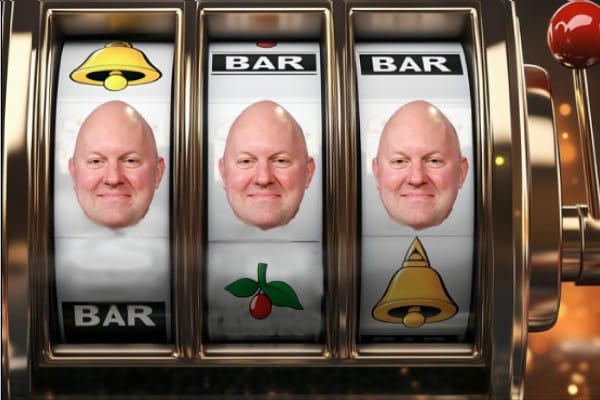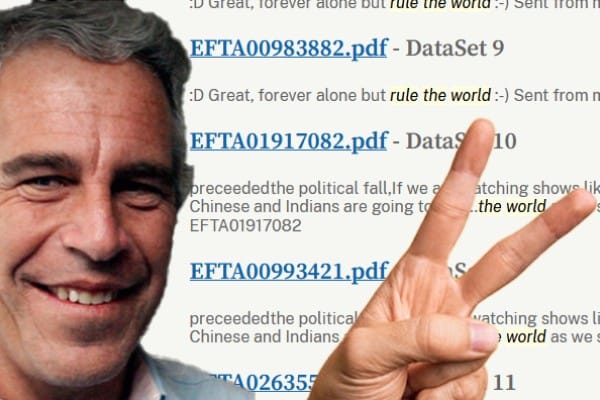Why the Media is Excited About Donald Trump
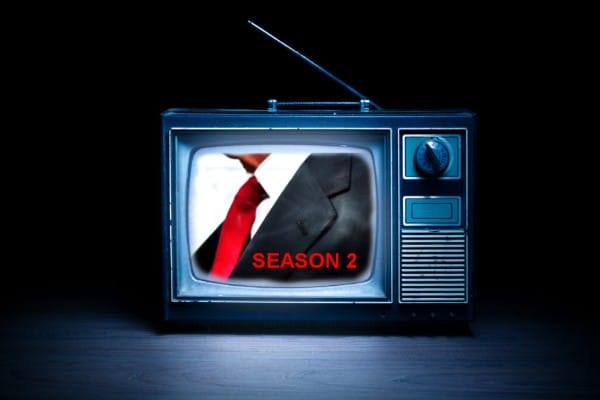
I initially wrote this piece before the assassination attempt on Donald Trump last weekend. It was published the morning that happened, just before it happened, but made available at the time only to paid subscribers, because I have recently adopted a gimmick whereby paid subscribers get all my articles a week before everyone else.
This piece should be read with that context in mind, but it also unwittingly links in with its theme: News moves fast. I never actually thought of what I’m doing here as news commentary until I started staggering my releases between paid and free subscribers, and now I’m keenly aware once again of the immediacy of the news cycle, and the discrepancy between views now, and views later on.
What Donald Trump represents for the news media is views now. And the media is champing at the bit for that chaos, a fact which is going to affect everything you see in the media for the next four months associated with the American election. Keep this context in mind as the reason this piece does not mention the assassination attempt and will not feature that photograph. But in some other ways it’s more relevant now than it was last weekend.
When I worked in media there was a noticeable change in the type of content that was coming down the pipeline from Editorial starting from around the point that Donald Trump won the Republican nomination in 2016.
In its heyday, Cracked sourced the vast majority of its articles from ideas pitched to a robust editorial team from the community, to be researched and written up into features by a crew of ghostwriters that included myself, but by 2016 the dismantling and disempowerment of internet media was well on its way and we were largely just writing to ideas that Editorial came up with themselves.
Those pitches were naturally based on internal stats about what kinds of articles were getting views and traffic, and during the second half of the twenty-teens that meant anything Donald Trump. I wrote and researched so much about Donald Trump over my last couple of years with the publication that my face turned tangerine. That escalated when the Russian collusion scandal started heating up.
Cody Johnston and Katie Stoll, who do the Some More News YouTube show, began that show on Cracked where it was almost entirely comedy news about the Trump administration. We had several of these types of shows running at the same time, some of them formatted as “after the game” style rundowns of the escalating insanity that was America under Trump.
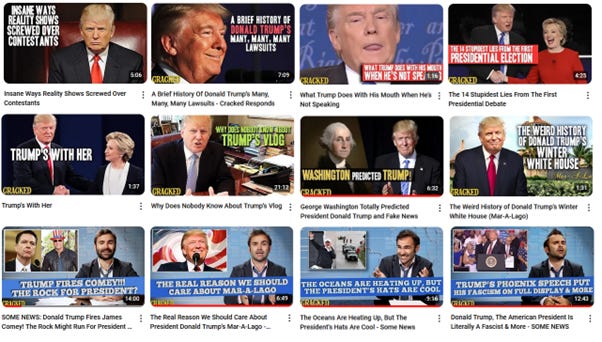
Despite popular assumption it wasn’t this that tanked the site. For a while it’s what was keeping us afloat. There was a powerful market for this content. Every wacky can-you-believe-he-said-that moment. The crazy shit he tweeted. The newest twists and turns in the Russia investigation. We were treating it like a TV show because it was one. That was the point of it. That’s why he was there.d
In the Slack channel shortly after the election I remember someone from Editorial telling us that, as bad as this was for the country, it was a gift for comedy writers.
It seemed inevitable that the United States would make a game show host its president eventually. It wasn’t just a gift for comedy writers, it was a gift for media as a whole during a time when traditional media was collapsing. Between 2015 and 2020, the ratings boost to cable networks was phenomenal. That followed a long, steady decline in public engagement with the traditional media models that had been happening since the advent of the internet, and moreso with social media.
By 2015 news and other consumable media were firmly in the grasp of curated social media feeds, primarily Facebook, and Zuckerberg was well into the next phase of his project to ruin the internet for everyone. This was the year of “pivot to video” and other basic missteps in interpreting user trends that crippled written media’s ability to turn a profit or just break even.
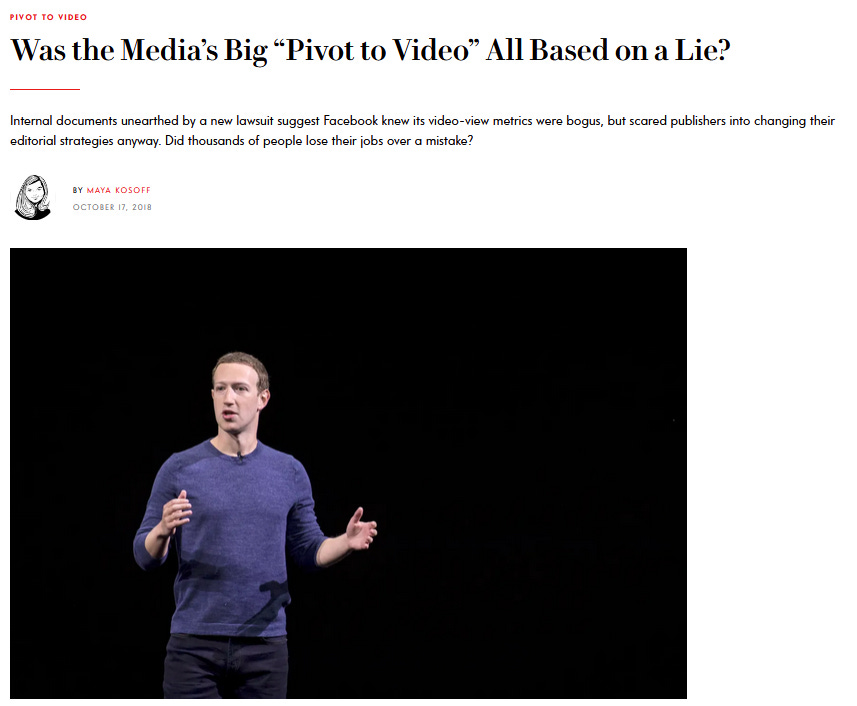
Donald Trump’s campaign, his win, and the subsequent circus of his four years in office was like throwing gasoline on some smouldering coals—a much shorter but fiercer burn. With all of his lambasting of the media as an institution, popularizing the phrase “fake news,” as tiresome as that is now, he was paradoxically its messiah. But only for those who were willing to sell their souls to him.
The Trump campaign’s slogan should have been Make Politics Sensational Again, if only that worked as an acronym. As much as people try to analyse the President Trump phenomenon—Economic anxiety? Racist backlash?—I don’t know that enough has been said about the fact that people were just bored. There’s a cliché that came out of a G. Michael Hopf novel and a hell of a lot of social media people with Classical Roman statues in their profiles thought made a great meme, and it goes something like: “Hard times create strong men. Strong men create good times. Good times create weak men. Weak men create hard times.”
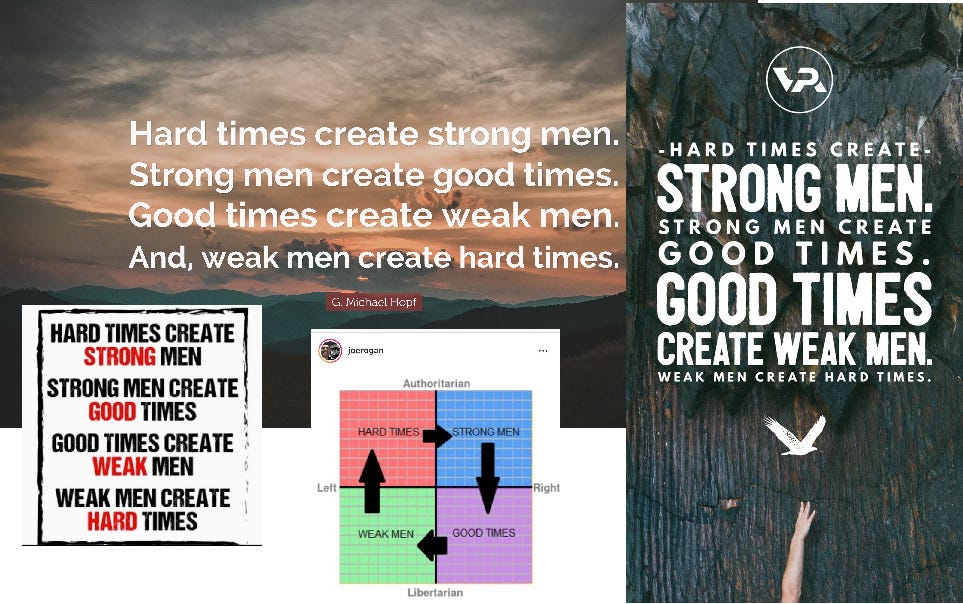
The accuracy of that statement is dubious and I’d counter it with something like “Good times create bored people, bored people manufacture excitement and conflict.” That doesn’t look as good on an image macro. But Donald Trump didn’t come in like a wrecking ball out of nowhere, he wasn’t installed. He didn’t have an overwhelming mandate, he lost the popular vote by a very notable margin, but the phenomenon of Trump was nevertheless a response to market demand. People wanted something to watch.
Trump was in many ways the TV president. His primary focus has been on celebrity throughout his entire life. It’s like the soul of a Kardashian was accidentally born into the body of a pudgy real estate developer and he still decided to run with what he was given. Historians will view Steve Bannon as the man who created President Trump but serious and honest ones will see that Bannon shares that stage with Mark Burnett, creator of The Apprentice.


It was Burnett who took Trump, a declining 80s celebrity yuppie, and really launched his image as a power broker. He was never a very good businessman. To mask the fact that he wasn’t selling a particularly good product, he tried to make himself the product, like putting Michael Jordan’s name on a pair of shitty sneakers.
Except that isn’t a good analogy either because Michael Jordan is good at basketball. Donald Trump is the Harlem Globetrotters. You know, the basketball team you thought was real when you were a little kid because they pretended to be one on TV, and manufactured the illusion that they were incredibly skilled because they wiped the floor with the worst teams in the league and did so in a performative and entertaining way.
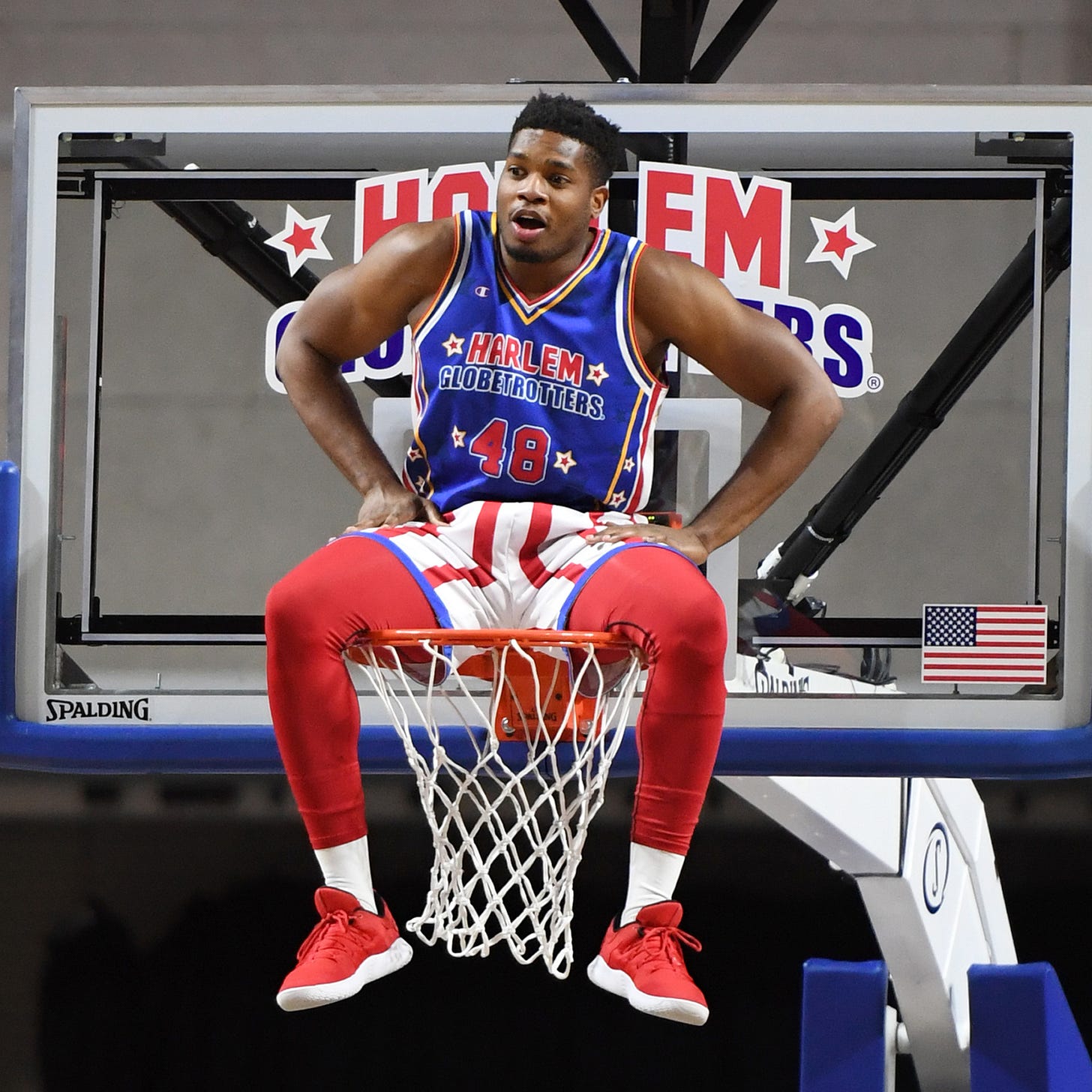
During his opening monologue to the 2016 Emmy awards Jimmy Kimmel predicted the way that the next four years were going to play out. The election itself had yet to take place but the historic media spectacle had already begun and Trump’s year-long road to the White House via the Republican primaries and then the Clinton debates felt like it lasted as long as a full presidential term in itself. Kimmel, pointing out Mark Burnett in the audience, said “we don’t have to watch reality shows anymore because we’re living in one.”
He didn’t mean that in a positive way, but from the smile on Burnett’s face you can tell he viewed things differently. What television producer wouldn’t want that honour?
For those of us who weren’t directly in the path of the wrecking ball the Trump presidency was just that—a long, spectacular reality TV show. Highest ratings in history. We actually came to view the people in his administration as contestants and betting on how long it took each of them to be voted off the island. We were measuring them in “mooches,” a metric named after the White House Communications Director Anthony Scaramucci whose tenure lasted only ten days.
The ride came at the cost of a resurgence in white nationalism that hadn’t been seen for decades. People felt comfortable throwing Roman salutes and flying the swastika in full public view again. They Made America, a certain section of America, Afraid Again. But guys like me were mostly okay. I mean obviously, me specifically, living outside of America, I was super okay, but in the US, guys like me, media guys, mostly white, middle class, status quo type people. People with privilege, as they say, and you can balk and scoff but it’s true. Right wing or left wing we could afford to be entertained. It wasn’t costing us as much.
I think that Covid-19 more than anything was what led to the ultimate cancellation of White House Apprentice, the highest rating reality game show in history, in 2020. The Russia investigation was probably the best season of TV ever aired, but it was followed up with the Covid season, and, well, sometimes even the biggest hit TV shows can tank due to one shitty storyline.
Had such a historic global distraction not occurred, America might have had the stamina for a second consecutive Trump term, but like the physical effects of the virus itself, I think fatigue just set in. The thrill ride jumped the shark with the Mueller report. There were of course a lot of people who didn’t want the Trump train to stop, least of all the Donald himself—an insurrection attempt at the Capitol was another historic first—but there was also such a sense of relief. The loud frothy-mouthed Mango Mussolini was swapped out for Sleepy Joe and America took a little break.
And cable ratings plummeted.
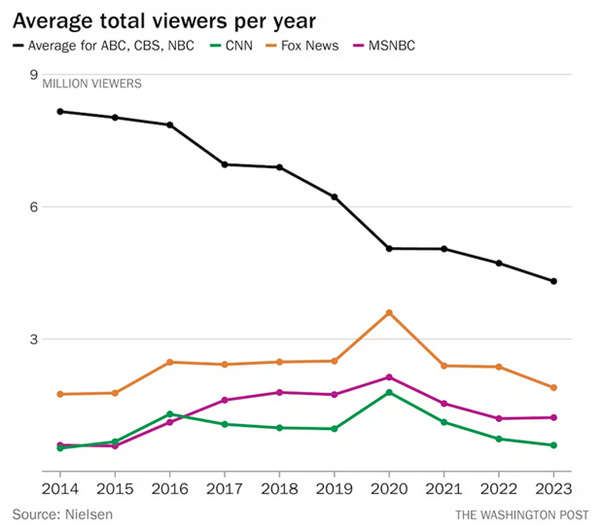
This Nielsen graph provided by Washington Post shows nothing but steady decline for commercial broadcasters over the past decade, immune from the Trump bump, but the exuberance of cable TV matched Trump’s energy and his freak. What exactly does Sleepy Joe bring to the table for hysterical pundits to either slobber over or propagandize as the end of American democracy? Despite desperate and unconvincing attempts by Fox, Breitbart, and the Daily Wire to paint Biden as an ultra-radical communist autocrat second only to Stalin or the Khmer Rouge, the truth is that he’s about as centrist as it gets and as exciting as a hard boiled egg on dry toast.
There’s a reason why the media for the last four years has leaned on the story of Joe Biden’s son having been a crack addict like it’s the equivalent of the president selling missiles and bootleg whiskey to Iran from a secret bunker under the Teapot Dome. America is addicted to presidential scandal and right now it’s sniffing markers to chase the same high it once got from crystal meth.
It's four years after Trump left office and all the highest rating political news is still whatever the hell Donald Trump is doing on any given day. From the FBI raid on Mar-a-Lago to recover secret documents, from the many court trials Trump has faced since leaving office—the molestation of E. Jean Carroll, the Trump Corporation tax fraud, the Stormy Daniels scandal—it hogs the nation’s attention even during major international conflict and horror in Ukraine and the Gaza Strip. Why wouldn’t the media be excited that we’re gearing up now for the belated next season of President Donald Trump?
This time he’s a convicted felon who the Supreme Court says can’t be punished for breaking the law. He’s angrier, crazier, driven by vengeance, and won’t make the same mistakes.
Recently in an interview with David Zaslav, the media magnate in charge of Warner Brothers and, under it, hundreds of other major media properties including CNN, Zaslav was asked who he endorses for president, and he refused to name either Trump or Biden, saying instead that he supports whichever one of them is better for his companies. When you look at the objective facts of the matter, there’s only one way you can interpret that response. CNN is back on the Trump train next to Fox. Zaslav and Murdoch together in the box seats. Elon Musk, who controls Twitter, is also ramping up his endorsement of Trump.
All of these media companies together control a huge portion of the flow of information you receive about the campaigns of the two octogenarian dinosaurs running for election this year. During, as I’m writing this, a full scale (and extremely good for ratings) panic among Democrats about Joe Biden’s viability for re-election after a disastrous performance by Biden during a CNN-run debate.
At least, these media platforms are telling you that there’s a panic. It certainly doesn’t seem to be reflected in the polls.
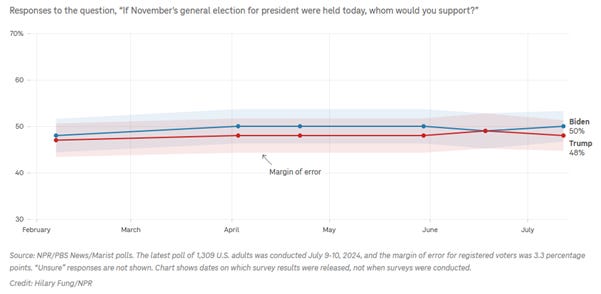
I am not suggesting that CNN somehow rigged the debate to make Joe Biden look and sound like an extra from a Romero movie. I’ve seen that kind of nonsense argued, but it’s an unhelpful and counterproductive level of conspiratorial thinking.
That said, it’s important to view everything that you see and hear during the coming months through the lens of what the people presenting the information might want you to believe. How they might be nudging the needle, consciously or unconsciously, in one direction or the other.
I’m the furthest thing from somebody who should be advising political strategy. I’d prefer that Trump doesn’t win the election but I have absolutely no clue on the subject of whether Biden should drop out and endorse a different candidate or how clear it is that that’s even possible, legally or logistically. What I am a strong advocate for is media literacy. Americans, please be conscious not only of the information you are consuming but who is delivering it to you and what their motivations are. They are people, like you. The media, itself, is an animal that will fight for its own survival.
There is a lot at stake in this election, but whatever the result, media guys are going to be fine. In a second Trump presidency, no matter what else burns, they’ll be fine. They’ll be better than fine. The ratings are going to be spectacular.




